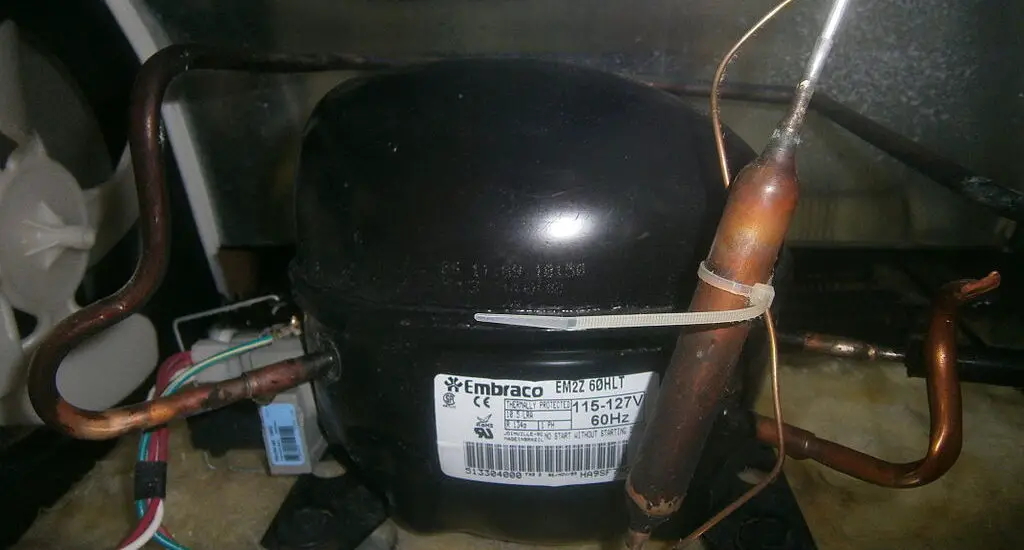If your refrigerator compressor bangs when shutting off, this detailed guide will cover all aspects of this issue to help you diagnose and fix the problem.

Table of Contents
How to Diagnose the Problem
Finding the root cause of the banging sound requires some detective work. Depending on your level of expertise and comfort, some steps are simple DIY tasks, while others may require professional assistance.
Check Visible Components: Power off the refrigerator and unplug it. Remove the back panel to expose the compressor. Look for any loose screws, bolts, or other components and tighten them. Wear safety gloves and goggles during this process.
Listen Carefully: Plug the refrigerator back in and listen to the compressor as it shuts off. The type of sound can often help identify the problem. If it’s a high-pitched bang, it could be a pressure issue. A metallic clunk might indicate loose components.
Test Pressure: Measuring the refrigerant pressure requires specialized tools like a manifold gauge set. If you’re not trained in handling refrigerants, it’s advisable to call a technician for this step, as improper handling can be dangerous.
If your refrigerator uses R134a, R22, R12, or R502 refrigerant, you can use this Lichamp AC Gauges A/C Diagnostic Manifold Gauge Set listed on Amazon to test the pressure.
Steps to Fix the Banging Noise
Once you’ve diagnosed the problem, there are several routes you can take to fix it. Here they are:
Check for Loose Screws: Open the back panel and tighten any loose screws around the compressor and its mounting brackets. Use a suitable screwdriver or wrench but be careful not to overtighten and strip the screws.
Assess the Compressor Mounts: These are rubber or metal brackets that hold the compressor in place. Check for wear and tear. If they look worn out, replace them. This task may require you to lift the compressor slightly, so proceed with caution or seek professional help.
Test and Adjust Pressure Levels: If you found a pressure imbalance during diagnosis, use a manifold gauge set to adjust the refrigerant pressure according to the manufacturer’s guidelines. This is best done by a qualified technician to avoid complications.
Consider Replacement: If the refrigerator is old and the compressor is still making a banging noise despite your efforts, it may be time for a new appliance. Continuous loud noises can signify a failing compressor, which is costly to replace.
Check out these other articles…
Compressor Sweating: Your Complete Guide
Short Cycling of Refrigeration Compressor: Proven solutions
Refrigerator Compressor Always On: 4 Causes & Sure Fixes
Refrigerator Compressor Auto Cut Off: Your Ultimate Guide
Refrigerator Compressor Burnout: Identification & Solutions
Common Reasons Why a Refrigerator Compressor Bangs When Shutting Off
It can be alarming to hear a loud banging sound from your refrigerator, specifically from the compressor area when it’s shutting off. Identifying the reason behind it is the first crucial step towards a solution. Here are the most common reasons:
Loose Components: Over time, screws, bolts, or internal components may become loose due to the compressor’s regular vibrations. This looseness can create a knocking or banging sound as the compressor winds down.
Pressure Imbalance: Your refrigerator maintains a specific pressure level for the refrigerant gas to circulate efficiently. When this pressure is imbalanced, usually too high, it can cause the compressor to make loud noises like banging when shutting off.
Age of the Refrigerator: As your refrigerator ages, wear and tear on its various components, including the compressor, becomes inevitable. Older compressors are more prone to making noise due to weakened or worn-out parts.
When to Seek Professional Help
If you’ve tried all the above methods and still face issues, consult a certified appliance technician. Ignoring the problem could lead to more serious issues like complete compressor failure, which can be costly.